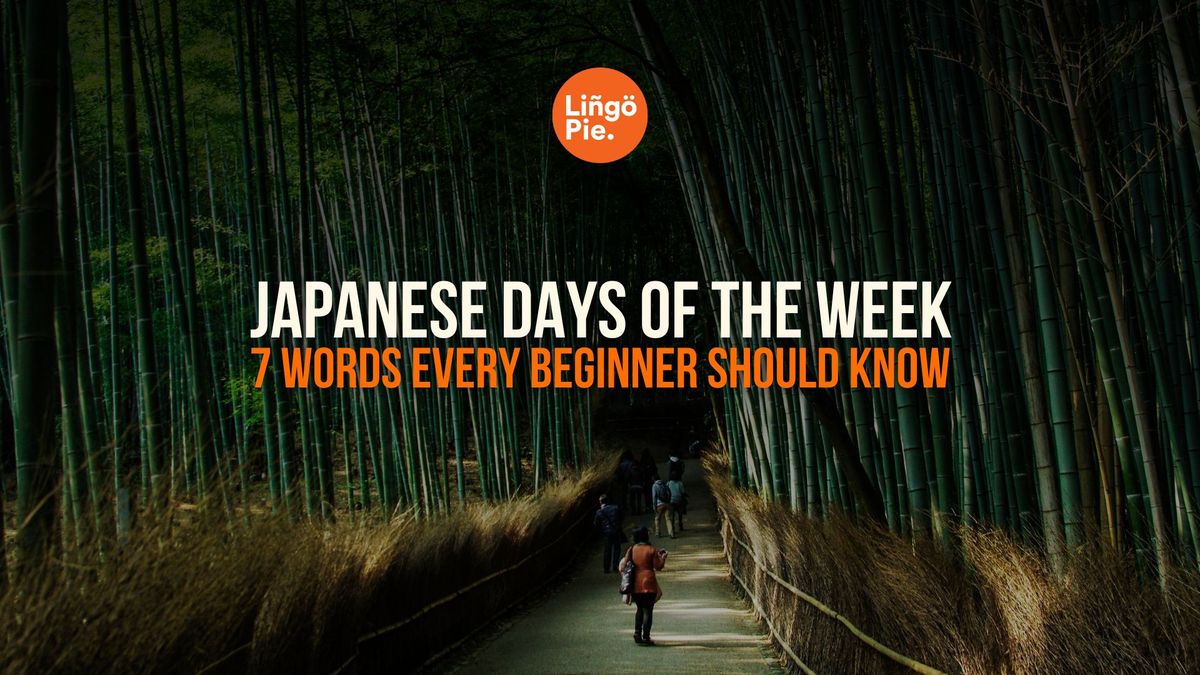When I first decided to learn Japanese, I felt lost. Where should I start? What should I learn first? It was overwhelming. But then I stumbled upon a simple yet powerful starting point: the days of the week. I know it sounds basic, but mastering these seven words became my stepping stone to Japanese fluency.
Fast forward a few years, and I found myself working in an IT company in Shibuya, Tokyo. Suddenly, those seemingly simple words became crucial in my daily life. That's why I'm writing this guide for you. I want to share how learning the days of the week in Japanese kickstarted my journey and how it can do the same for you.
In this post, I'll break down everything you need to know about the 7 Days of the Week in Japanese, and I'll show you the best ways to learn Japanese.
📍16+ Crazy Japanese Curse Words And Expressions
📍6 Books and Textbooks to Learn Japanese
📍18 Untranslatable Japanese Words We Need In English
📍How To Say Happy Birthday In Japanese In 7+ Easy Ways

Days Of The Week In Japanese
Unlike complex grammar rules or lengthy vocabulary lists, these are just seven simple words that you'll use almost daily. What's even better is the pattern they follow. Each day of the week is composed of three characters, two of which remain constant across all seven days.
Just as we use the suffix "-day" in English, Japanese uses "youbi" (曜日) for every day of the week. This consistent structure makes memorization a breeze. To help you get started, I complied below a table of the days of the week in Japanese:
| English | Romaji | Hiragana | Kanji |
|---|---|---|---|
| Monday | Getsuyoubi | げつようび | 月曜日 |
| Tuesday | Kayoubi | かようび | 火曜日 |
| Wednesday | Suiyoubi | すいようび | 水曜日 |
| Thursday | Mokuyoubi | もくようび | 木曜日 |
| Friday | Kinyoubi | きんようび | 金曜日 |
| Saturday | Doyoubi | どようび | 土曜日 |
| Sunday | Nichiyoubi | にちようび | 日曜日 |
Now, let's dive deeper into each day of the week. I'll break down the meaning behind each name, share some tips I used to remember them and provide context on how these words are used in everyday Japanese conversations.
But before anything else, check out these Days of the Week Song in Japanese!
月曜日 (げつようび/ getsuyoubi): Monday in Japanese
Monday is 月曜日 (げつようび / getsuyoubi), which literally translates to "Moon Day." This might sound familiar, and for good reason - the English "Monday" actually has the same etymological roots, derived from "Moon's day" in Old English. This connection makes for an excellent mnemonic to help you remember.
| Japanese | Romaji | English Translation |
|---|---|---|
| 月曜日は会議があります。 | Getsuyoubi wa kaigi ga arimasu. | There's a meeting on Monday. |
| 毎週月曜日にヨガのクラスに行きます。 | Maishuu getsuyoubi ni yoga no kurasu ni ikimasu. | I go to a yoga class every Monday. |
The kanji 月 is particularly interesting because it's a pictogram that resembles a crescent moon. Once you visualize this, it becomes even easier to associate it with Monday. In fact, this kanji character pulls double duty in Japanese - it's also used to mean "month," likely because months were traditionally measured by the cycles of the moon.
火曜日 (かようび/kayoubi): Tuesday in Japanese
Tuesday in Japanese is 火曜日 (かようび / kayoubi), which literally translates to "Fire Day." This connection to fire might seem surprising at first, but it actually has fascinating roots in ancient Eastern astrology.
| Japanese | Romaji | English Translation |
|---|---|---|
| 火曜日は早く帰れます。 | Kayoubi wa hayaku kaeremasu. | I can go home early on Tuesday. |
| 火曜日にプロジェクトの締め切りがあります。 | Kayoubi ni purojekuto no shimekiri ga arimasu. | The project deadline is on Tuesday. |
The kanji 火 is particularly interesting because it's a pictogram that visually represents fire. If you look closely, you can see it depicts a three-pronged dancing flame with sparks on both sides. This vivid imagery can help you remember its meaning and association with Tuesday.

水曜日 (すいようび/suiyoubi): Wednesday in Japanese
Wednesday in Japanese is 水曜日 (すいようび / suiyoubi), which literally translates to "Water Day." The kanji 水 is a fascinating character with a rich history. It evolved from an ancient Chinese pictogram that depicted flowing water. If you use your imagination, you might be able to see how the character represents ripples or waves in water.
| Japanese | Romaji | English Translation |
|---|---|---|
| 水曜日は友達と映画を見に行きます。 | Suiyoubi wa tomodachi to eiga wo mi ni ikimasu. | I'm going to watch a movie with my friend on Wednesday. |
| 毎週水曜日は図書館で勉強します。 | Maishuu suiyoubi wa toshokan de benkyou shimasu. | I study at the library every Wedne |
Interestingly, when 水 is used on its own to mean "water" in everyday Japanese, it's usually pronounced as みず (mizu) rather than すい (sui). This shift in pronunciation is common in Japanese, where kanji can have different readings based on context.
木曜日 (もくようび / mokuyoubi): Thursday in Japanese
Thursday in Japanese is 木曜日 (もくようび / mokuyoubi), which literally translates to "Wood Day" or "Tree Day." One thing that makes this memorable is the kanji 木. If you look at it at face value, it is a visually descriptive character that represents a tree, showing a trunk with branches extending from it.
| Japanese | Romaji | English Translation |
|---|---|---|
| 木曜日に新しいプロジェクトが始まります。 | Mokuyoubi ni atarashii purojekuto ga hajimarimasu. | A new project starts on Thursday. |
| 木曜日は残業することが多いです。 | Mokuyoubi wa zangyou suru koto ga ooi desu. | I often work overtime o |
It's interesting to note that when 木 is used on its own to mean "tree" in everyday Japanese, it's usually pronounced as き (ki) rather than もく (moku). This change in pronunciation based on context is a common feature in Japanese.

金曜日 (きんようび/ kinyoubi): Friday in Japanese
Friday in Japanese is 金曜日 (きんようび / kinyoubi), which literally translates to "Gold Day" or "Metal Day." Unlike some of the more straightforward pictograms we've seen, this one doesn't simply depict the element gold on its own. Instead, it represents gold buried under the earth, flashing when observed.
| Japanese | Romaji | English Translation |
|---|---|---|
| 金曜日は友達と飲みに行きます。 | Kinyoubi wa tomodachi to nomi ni ikimasu. | I'm going out for drinks with friends on Friday. |
| 毎週金曜日にレポートを提出します。 | Maishuu kinyoubi ni repooto wo teishutsu shimasu. | I submit a report every Friday. |
It's worth noting that when 金 is used on its own to mean "money" or "metal" in everyday Japanese, it's usually pronounced as かね (kane) rather than きん (kin). This shift in pronunciation based on context is a common feature in Japanese.
土曜日 (どようび / doyoubi): Saturday in Japanese
Saturday in Japanese is 土曜日 (どようび / doyoubi), which literally translates to "Earth Day" or "Soil Day." If you look at the character 土, you might be able to imagine a small hill or pile of soil.
| Japanese | Romaji | English Translation |
|---|---|---|
| 土曜日は家族でピクニックに行きます。 | Doyoubi wa kazoku de pikunikku ni ikimasu. | We're going on a family picnic on Saturday. |
| 土曜日にボランティア活動があります。 | Doyoubi ni borantia katsudou ga arimasu. | There's a volunteer activity on Saturday. |
To help remember Saturday, try visualizing yourself planting your feet firmly on the ground at the start of your weekend. You could imagine taking a Saturday morning walk in a park, feeling the earth beneath your feet, or picture yourself gardening and getting your hands dirty in the soil.

日曜日 (にちようび / nichiyoubi): Sunday in Japanese
Sunday in Japanese is 日曜日 (にちようび / nichiyoubi), which literally translates to "Sun Day." An interesting point to note is that the character 日 appears twice in 日曜日, but it's pronounced differently each time. The first 日, meaning "sun," is pronounced にち (nichi), while the second 日, as part of 曜日 meaning "day," is pronounced び (bi).
| Japanese | Romaji | English Translation |
|---|---|---|
| 日曜日はゆっくり寝坊します。 | Nichiyoubi wa yukkuri nebou shimasu. | I sleep in late on Sunday. |
| 毎週日曜日に両親に電話をかけます。 | Maishuu nichiyoubi ni ryoushin ni denwa wo kakemasu. | I call my parents every Sunday. |
Other Japanese Words For The Days Of The Week
There are several other useful time-related words that you'll frequently encounter in everyday Japanese conversations (or even in Japanese anime). These words help you talk about yesterday, tomorrow, and other relative time frames.
| English | Japanese | Romaji |
|---|---|---|
| Today | 今日 | Kyou |
| Tomorrow | 明日 | Ashita |
| Yesterday | 昨日 | Kinou |
| The day after tomorrow | 明後日 | Asatte |
| The day before yesterday | おととい | Ototoi |
| This week | 今週 | Konshuu |
| Next week | 来週 | Raishuu |
| Last week | 先週 | Senshuu |
| Weekday | 平日 | Heijitsu |
| Weekend | 週末 | Shuumatsu |
| Every day | 毎日 | Mainichi |
| Every week | 毎週 | Maishuu |
| What day (of the week)? | 何曜日 | Nanyoubi |
These words are essential for navigating daily life in Japanese, whether you're scheduling appointments, making plans with friends, or discussing your weekly routine.

Useful Japanese Phrases For The Days Of The Week
If you've been watching Japanese TV series, you've probably noticed how often characters mention days of the week in their conversations. These shows are a great way to hear native speakers use day-related phrases in context. Let's look at some of these below!
| Japanese Phrase | Romaji | English Translation |
|---|---|---|
| 月曜日が嫌いです。 | Getsuyoubi ga kirai desu. | I hate Mondays. |
| 火曜日は忙しいです。 | Kayoubi wa isogashii desu. | Tuesdays are busy. |
| 水曜日に会議があります。 | Suiyoubi ni kaigi ga arimasu. | There's a meeting on Wednesday. |
| 木曜日は早く終わります。 | Mokuyoubi wa hayaku owarimasu. | Thursday ends early. |
| 金曜日を楽しみにしています。 | Kinyoubi wo tanoshimi ni shiteimasu. | I'm looking forward to Friday. |
| 土曜日は何をする予定ですか? | Doyoubi wa nani wo suru yotei desu ka? | What are your plans for Saturday? |
| 日曜日はゆっくり過ごします。 | Nichiyoubi wa yukkuri sugoshimasu. | I spend Sunday relaxing. |
| 来週の月曜日に始まります。 | Raishuu no getsuyoubi ni hajimarimasu. | It starts next Monday. |
| 先週の金曜日に終わりました。 | Senshuu no kinyoubi ni owarimashita. | It ended last Friday. |
| 毎週木曜日にジムに行きます。 | Maishuu mokuyoubi ni jimu ni ikimasu. | I go to the gym every Thursday. |
By incorporating these phrases into your own Japanese practice, you'll sound more natural and be better equipped to discuss your daily and weekly activities.
Learn Japanese With Lingopie
As we've explored in this guide, mastering the days of the week in Japanese is an essential stepping stone in your language-learning journey. If you're eager to take your Japanese learning to the next level, why not try Lingopie today?
With Lingopie's features, you can immerse yourself in authentic Japanese TV shows and movies, hearing native speakers use these day-related phrases in context. It's a fun and effective way to reinforce what you've learned and pick up even more natural expressions.
Plus, with interactive subtitles and personalized learning tools, you can turn your entertainment time into productive language practice. Don't just learn Japanese – experience it with Lingopie and start your journey toward Japanese fluency today!








![12 Best Japanese TV Shows To Learn Japanese [2026]](/blog/content/images/size/w300/2023/09/C-pia-de-imgs-blog---Spanish-1--10-.png)
![How To Write The Japanese Kanji For Love [+ FREE Printable]](/blog/content/images/size/w300/2025/03/Japanese-Kanji-for-Love-1.jpg)
